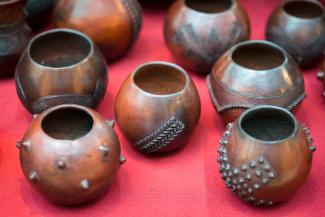
Jabulile Nala
Hailing from Johannesburg, South Africa, Jabulile Nala (Zulu) is a world-renowned ceramic artist and instructor. The daughter of Nesta Nala, another famous potter, she carries on the 2,000-year-old Zulu tradition of women potters; her own family lineage of potters can be traced back to 1900. Born in Eshowe, South Africa in 1969, Nala learned the craft from her mother and grandmother, and has been making art since she was 11 years old. Now, she and her sisters continue her family’s legacy as acclaimed potters. Nala recognizes Zulu pottery for both its significance to her cultural identity and as an art form: “Zulu pottery for me means a lot because in our culture we use Zulu beer pots to drink Zulu beer, so it is my culture; also at the same time [it is my] talent, because we do different things from culture and then we create more designs.”
Nala uses the oldest known firing method for her ceramics. After sculpting objects from hand, such as traditional beer pots, ceramic plates, and vases, she places them in a hole in the ground that she covers with tinder and then a protective covering. To blacken the pots, she fires them twice. Once the fire has been consumed, she rubs animal fat or polish on the pots to add a soft luster. For the design of her ceramics, Nala combines the old with the new. She uses classic patterns, such as one inspired by past Zulu warriors’ scarred body decorations, and she skillfully utilizes negative space to create beautiful designs and patterns. Nala adds her unique spin by making larger, more elaborate styles or more sculpted shapes.
In addition to her work as an artist, Nala also leads workshops to uphold the Zulu tradition and support local livelihoods, particularly by helping older women hone their pottery skills. “We teach them how to make the pots smarter, better, and we choose some of the best to sell,” she says. Although children today might not be able to devote themselves to pottery at as young an age as Nala did, she has hope that youth will eventually learn. Noting the power of learning together, she says, “If we teach one by one, or Nala family only . . . it is not enough. We have to teach the generation.”
Pottery plays an integral role in Zulu culture and is used for rites and rituals such as weddings, births, marriages, and burials, and it often symbolizes hospitality and communality. “A ceremony that is important for Zulu beer is the ceremony for amadlozi, or ancestors. A second way to use Zulu beer pots, when a girl is married, we give that family a beer pot as a gift from her. We call it umabo in Zulu,” explains Nala. The pots are also customary for household use, such as the large Imbiza pot used for brewing, the Ukhamba pot for serving, and the Umancishana pot for cooking meat and storing food and drinks. Despite its cultural importance, being a potter is a challenge in South Africa where there are not many opportunities to sell pots and their value is not fully appreciated. Nala has traveled internationally to sell her art at the Santa Fe International Folk Art Market and the International Ceramics Festival in Wales, and she has been participating in the Cultural Survival Bazaars since 2017.
Join us at this winter's Cultural Survival Bazaars:
December 15–16: Cambridge Rindge & Latin School, Cambridge, MA
December 21–23: Prudential Center, Boston, MA
Visit bazaar.cs.org and facebook.com/culturalsurvivalbazaars for more info.
Photo credits/captions:
Pottery plays an integral role in Zulu culture in South Africa. Black pots must be fired twice to achieve their color. Photo by Jamie Malcolm-Brown.
